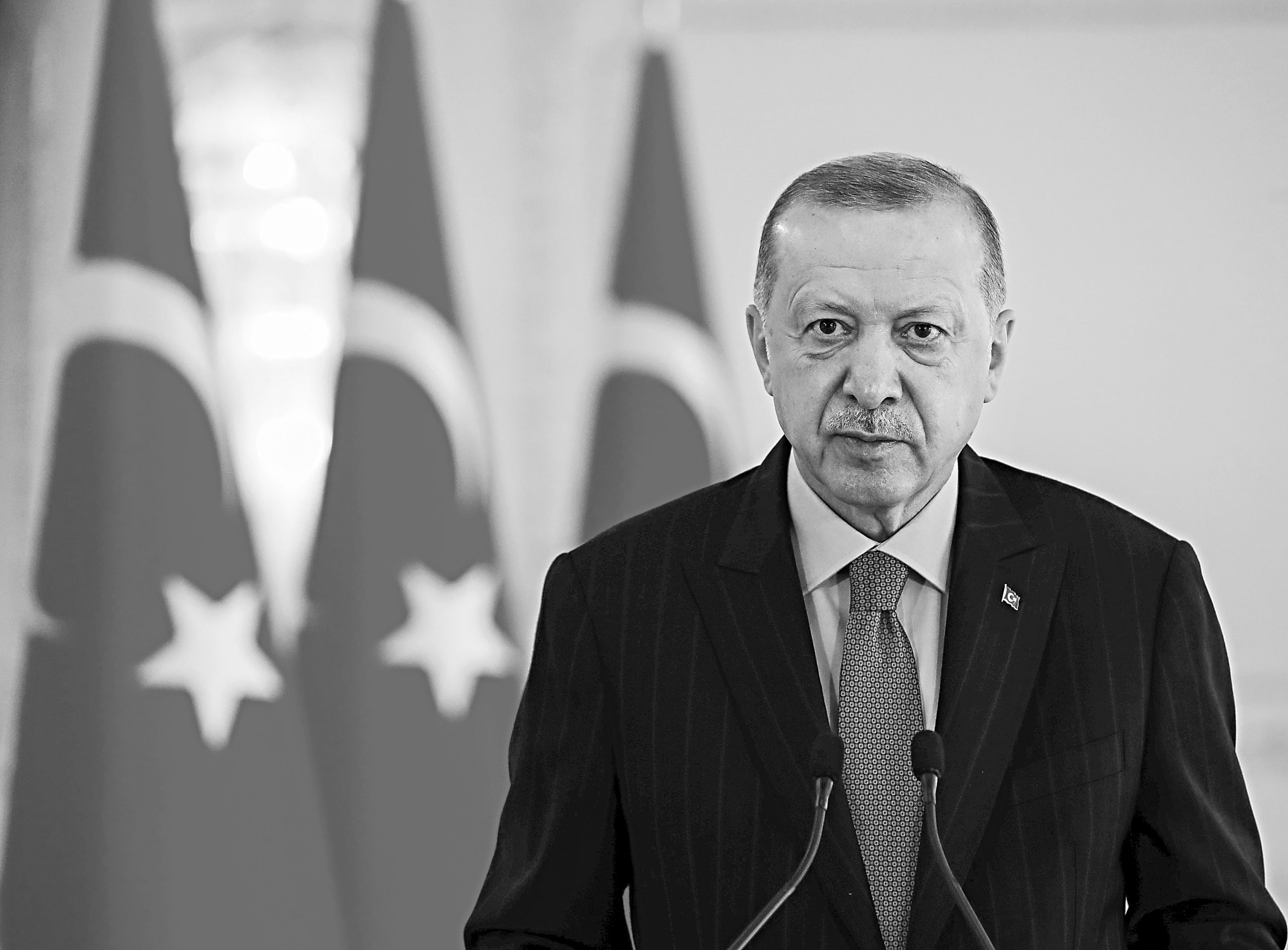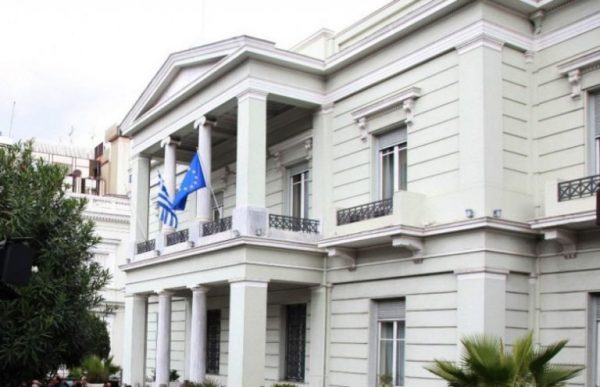
The upgrade of Greek-American relations, the imminent acquisition of F-35s and the internationalization of the Turkish proclivities by Athens are the three main reasons for the barrage of threats from Ankara officials.
Turkish President Recep Tayyip Erdogan has not yet come to terms with the visit of Greek Prime Minister Kyriakos Mitsotakis to the United States, while he is said to be particularly annoyed by Athens’ letter to the UN.
This was evident from the threats of the Turkish Foreign Minister Mevlüt Çavuşoglu, who once again referred to the demilitarization of Greek islands.
Toeing Erdogan’s line in escalating Turkish provocation, Çavuşoglu raised tones and said, according to Turkish media, that if the Greek side continues to militarize the islands, then Turkey can not remain uninvolved it is not “bluffing.”
In fact, he went so far as to raise the issue of sovereignty and said that Turkey would “take matters further if Greece continued to equip the islands.”
The head of Turkish diplomacy, referring to the Treaty of Lausanne, reiterated the narrative that Greece is violating international law on the status of the islands.
Erdogan’s new attack on Greece
At the same time, Erdogan continues to challenge our country as with new statements he referred to the issue of the Aegean and the Eastern Mediterranean, with Turkey talking about “protecting its rights without compromise.”
“The gradually increasing provocative actions of Greece in the Aegean Sea were discussed, somethin which violates international law and the conditions to which it is a party, as well as its efforts to take advantage of alliances, while it should act with understanding and cooperation.
It was stressed that our resolute stance for the protection of the rights and interests of our nation will be maintained without compromise “, the Turkish FM stated characteristically.
However, what concerns us from now on is how much more Recep Tayyip Erdogan will ratchet up tones and whether he will try to add further add tension to Greek-Turkish relations.
In the coming days, it is not ruled out that migrants will again try to reach the Greek islands from the shores of Turkey.
The fear of a “hot” summer with constant threats and moves to make impressions from the Turkish president exists as a powerful scenario, which Athens has studied and prepared for.

Athens responds to Ankara’s challenges with composure and determination
It is recalled that Greece, in a letter from the Permanent Representative of Greece to the UN to the Secretary General of the Organization regarding the alleged obligation to demilitarize the Aegean islands, put Ankara in its “place”.
Following instructions from Foreign Minister Nikos Dendias, the Greek Permanent Representative to the UN, Maria Theofili, delivered a letter to the Secretary-General of the Organization, in response to a letter sent by the Turkish Permanent Representative to the UN on September 30, 2021.
The breach of the Treaty of Lausanne
With this letter, which is the product of many months of thorough work by the competent services of the Ministry of Foreign Affairs, all the allegations of the Turkish side are rejected in their entirety, as they are legally, historically and factually unfounded.
Specifically, the whole of the Turkish argument regarding the “interconnection” of the Greek sovereignty of the islands and the adjacent Aegean islands with the alleged obligation of demilitarization of these islands is rejected.
It is emphasized that this interconnection is a clear violation of both the letter and the spirit of the Treaty of Lausanne of 1923 and the Treaty of Paris of 1947, which define permanent borders and territorial rights in the countries mentioned, without any other terms or obligations.
It is emphasized that according to international law, when states conclude a treaty defining borders or territorial sovereignty, their main purpose is to achieve stability and finality. For this reason, when a treaty defines a border or a definitive territorial settlement, that settlement is a real event in itself, which no longer depends on the treaty. 
The escalation of Turkish aggression and the casus belli
There is also a clear reference to the escalation of Turkey’s aggression, invoking casus belli, as well as the deployment of a large number of military forces against the Aegean islands.
At the same time, the criminal behavior of Turkey is pointed out with particularly threatening actions, both with the overflights of Greek territory, as well as with the harassment of Navy ships and research vessels.
The letter concludes by saying that Greece calls on Turkey to stop questioning its sovereignty over the Aegean islands, to refrain from the threat of use of force, thus violating Article 2 (4) of the UN Charter, and to stop carrying out illegal actions, which violate the sovereignty and sovereign rights of Greece in the Aegean and in the Eastern Mediterranean.
Latest News

German Ambassador to Greece Talks Ukraine, Rise of Far Right & Tariffs at Delphi Economic Forum X
Commenting on the political developments in his country, the German Ambassador stressed that it was clear the rapid formation of a new government was imperative, as the expectations across Europe showed.

Athens to Return Confiscated License Plates Ahead of Easter Holiday
Cases involving court orders will also be excluded from this measure.

Servicers: How More Properties Could Enter the Greek Market
Buying or renting a home is out of reach for many in Greece. Servicers propose faster processes and incentives to boost property supply and ease the housing crisis.

Greek Easter 2025: Price Hikes on Lamb, Eggs & Sweets
According to the Greek Consumers’ Institute, hosting an Easter dinner for eight now costs approximately €361.95 — an increase of €11 compared to 2024.

FM Gerapetritis Calls for Unified EU Response to Global Crises at EU Council
"Europe is navigating through unprecedented crises — wars, humanitarian disasters, climate emergencies," he stated.

Holy Week Store Hours in Greece
Retail stores across Greece are now operating on extended holiday hours for Holy Week, following their Sunday opening on April 13. The move aims to accommodate consumers ahead of Easter, but merchants remain cautious amid sluggish market activity.

Green Getaway Ideas for Easter 2025 in Greece
Celebrate Easter 2025 in Greece the sustainable way with eco-farms, car-free islands, and family-friendly getaways rooted in nature and tradition.

Civil Protection Minister Details Summer Firefighting Plans at Delphi Forum
At the 10th Delphi Economic Forum, Minister of Climate Crisis and Civil Protection Yiannis Kefalogiannis discussed Greece's plans for the upcoming fire season.

How Shops and Markets Will Operate During Easter Holy Week
The Easter holiday schedule has been in effect since April 10, with retail stores open Palm Sunday, and most supermarkets also operating to meet consumer demand for Easter shopping

Why Is the French Aircraft Carrier Charles De Gaulle in Piraeus?
Docking in Piraeus after a four-month deployment in the Indo-Pacific region, the admiral of the aircraft carrier the Charles de Gaulle says, "Greece is our best partner in the Mediterranean."









































 Αριθμός Πιστοποίησης
Αριθμός Πιστοποίησης